The US and Egypt: Between Islamists and Generals
Michele Dunne, Director of the Rafik Hariri Center for the Middle East, Atlantic Council
Photos | Transcript
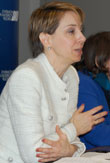 Washington, DC—On January 20th, WFPG hosted a Beyond the Headlines Series event with Michele Dunne, Director of the Atlantic Council's Rafik Hariri Center for the Middle East. WFPG President Patricia Ellis moderated the discussion on The US and Egypt: Between Islamists and Generals. Dunne, who previously addressed WFPG following the events in Tahrir Square one year ago, returned to offer her assessments of Egypt's political climate. Her remarks covered the rapidly changing political landscape in Egypt, including political parties, elections, the leadership of the military council, and current and future relations with the US.
Washington, DC—On January 20th, WFPG hosted a Beyond the Headlines Series event with Michele Dunne, Director of the Atlantic Council's Rafik Hariri Center for the Middle East. WFPG President Patricia Ellis moderated the discussion on The US and Egypt: Between Islamists and Generals. Dunne, who previously addressed WFPG following the events in Tahrir Square one year ago, returned to offer her assessments of Egypt's political climate. Her remarks covered the rapidly changing political landscape in Egypt, including political parties, elections, the leadership of the military council, and current and future relations with the US.
According to Dunne, some of the most encouraging developments in Egypt over the past year have been in the political sphere. Following the Egyptian military's removal of restrictions on the formation of political parties, over 50 new parties emerged, which indicate a significant increase in political activity. Furthermore, the first post-Mubarak elections, which were held for the lower house of parliament, were broadly accepted as legitimate due to the free and largely transparent manner in which they were run. Although the elections have not been perfect, more Egyptians are able to participate politically than ever before.
Dunne also discussed what she viewed as the more troubling developments in post-Mubarak Egypt, many of which relate to the actions of the Supreme Council of the Armed Forces (SCAF). The SCAF's lack of consensus on the shape and speed of the political transition going forward is serious cause for alarm, she said. Because the military leadership has kept all the decision-making power in its hands rather than bringing civilians into the transition, it is possible that Egypt could end up having elected civilian institutions with no real power. Furthermore, the SCAF's heavy domestic borrowing and overall mismanagement of the economy pose a very real threat to Egypt's immediate future. In addition to these concerns, Dunne said, the military's failure to reform internal security and police forces has led to serious and ongoing security problems throughout the country.
She also expressed her concerns about recent military actions against civil society organizations in Egypt, wherein the SCAF closed down several domestic and international NGOs and arrested their leadership—including 19 Americans. Such actions are forcing the United States to rethink its long-standing relationship with the Egyptian military. Although Dunne said it would be a shame for the US to give less assistance to a democratizing Egypt than it gave to an authoritarian Egypt, she believes the US's annual $1.3 billion aid package needs serious re-thinking. In place of the former agreement—which was essentially a monetary incentive for the Egyptian military to maintain peace with Israel—Dunne recommended negotiating a new relationship that supports Arab-Israeli peace but also addresses Egypt based on Egypt's needs, not Israel's needs. The US should work on forming a broader relationship with Egypt and its people, Dunne suggested. "The whole picture is changing in the Arab world, citizens and their elected representatives are going to count for a lot more," Dunne said. "So we need to rethink how we conduct these relationships."
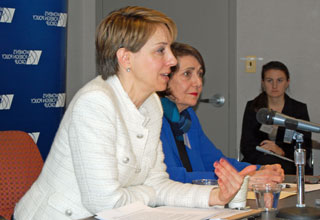 |
 |
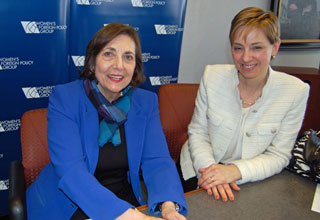 |
Michele Dunne addresses the WFPG
|
|
WFPG President Patricia Ellis and
Speaker Michele Dunne
|
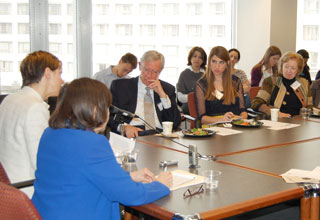 |
 |
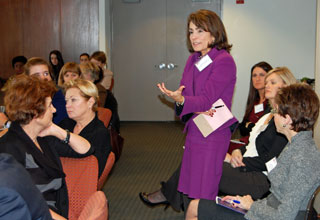 |
| |
|
|
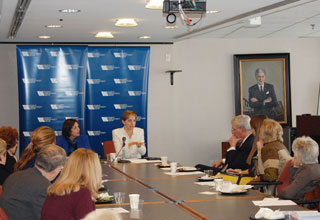 |
 |
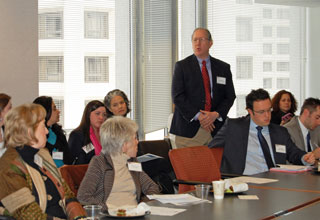 |
| |
|
|
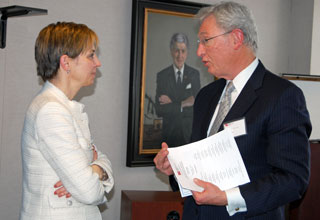 |
 |
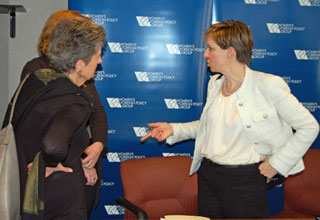 |
| |
|
|